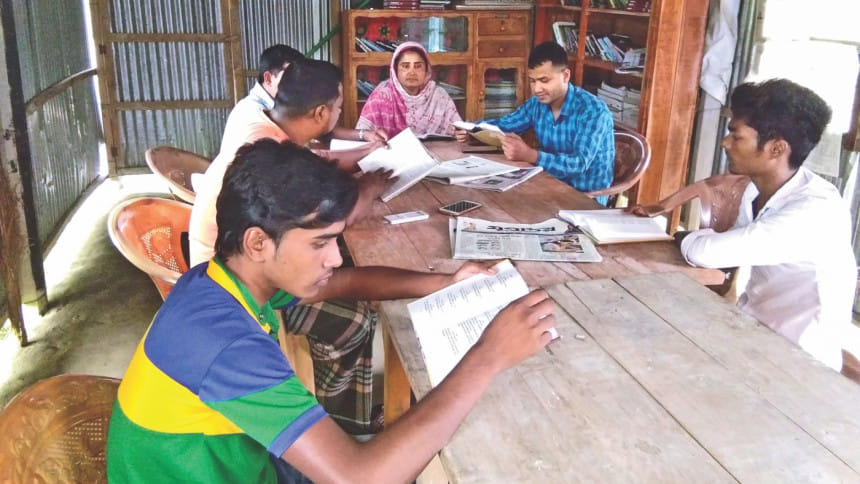That’s how the light gets in

Two book shelves, two tables and a couple of chairs in a tiny tin hut may not strike a city dweller as much of a library.
Yet, Golam Maola Alor Dishari Library is fostering enthusiasm among the book lovers in Dashiarchhara, a former Indian enclave in Kurigram’s Phulbari upazila.
It was established in September 2015 in West Ajwatary village of Dashiarchhara following the exchange of 162 enclaves between Bangladesh and India in August of the same year.
Growing up in the locality, library founder Momotaj Mohal Baby was well-aware of the deprivation of citizenship rights of the enclave dwellers and felt the need to do something for them, especially for the women.
“Between 2000 and 2015, I worked as a teacher at a Brac pre-primary school which had a Kishori Club. Girls could come play, sing, and read books, lent by different people. The reading section, however, stopped when a fee was attached to the service,” Momotaj said, recounting how she came up with the idea of opening a library.
Later, some of the club members told Momotaj that they missed reading books for free.
“Around 2009, I started collecting old books, and loaned those out to people for free for several days on condition of return,” she reminisced, adding that she had begun with 50 books.
When Dashiarchhara merged with Bangladesh, Momotaj decided to set up a library, accessible to both women and men.
“I particularly wanted to develop reading habit among girls and young women of Dashiarchhara because unlike boys, they cannot travel outside easily and learn about the world,” she asserted.
Besides, there is no library in any of the nine education institutions of the former enclave with a population of approximately 8,000 people, informed Harun-ur-Rashid Chairman of Phulbari Union Parishad.
He said women do not want to visit the library established by the Islamic Foundation Bangladesh in Kalirhaat village market in Dashiarchhara, as it remains open mostly in the evening and has only 40 books on religion.
In contrast, Momotaj’s library has a collection of 450 publications which include non-textbooks from novels, poetry, children’s literature, travelogues, science fictions, religious books, and guidebooks for high school and college goers.
“After the enclave exchange, I inspired my husband, Golam Maola to donate two decimals of land, where we built the tin hut spending Tk 45,000 from our joint savings,” said the 37-year-old woman.
The couple spent another Tk 15,000 for purchasing the furniture and over the years Momotaj spent Tk 40,000 to buy used books for the library at a lower price.
“I buy at least two to three books every month and subscribe to a daily and a monthly newspaper for the library spending about Tk 500 to Tk 600 per month,” mentioned Momotaj, who along with her husband currently work as teachers at a mosque-based literacy programme run by Islamic Foundation.
“I also received Tk 29,000 cash, and books worth Tk 29,000 from the National Public Library in Dhaka in two installments,” she informed.
Momotaj holds the post of the librarian and the general secretary of the seven-member committee that runs the library.
The library was named after her husband for his generous contribution of land and money, she said.
Returning from her day job in the morning, Momotaj spends most of her afternoons at the library, which remains open six days a week except Fridays from 4:00 pm to 5:30 pm.
The astute librarian informed that although initially she charged Tk 2 for membership, seeing little response she made the library free for all.
Locals can sit inside the tin-shed and read, or borrow one book for three days, she said.
“If borrowers do not return books after three days, I personally visit their houses to collect the books,” she said, adding that female patrons of her library mostly borrow books while the men prefer sitting at the library to read.
Mahmuda Akhtar, a first-year student of Kashipur Degree College, visits the library at least once or twice a week to borrow books.
“I like novels and have read a number of books from the Nazrul collection of the library. I also like Syed Waliullah’s work,” she said.
Mahmuda, however, wants more recently published novels and books on current affairs.
Avid reader of thrillers, Madhobi Akhter, however, wants more guidebooks, with her secondary school certificate exam coming up.
“We cannot afford to buy more than one guidebook. It helps if the library has guidebooks by various writers,” she said.
Assistant teacher of Dashiarchhara Multipurpose High School, Nur Hossain, who visits the library twice or thrice a week, said, “I try to encourage students to read books. But many do not want to come here because of the poor collection.”
With a monthly salary of Tk 4,500 from her teaching job, Momotaj cannot afford to keep up with the library users’ demand for new books.
Appealing to well-wishers for donations of non-text book for the library, she said she had applied for library registration to Kurigram District Public Library authority.
Librarian Mehedi Hasan of Kurigram District Public Library assured The Daily Star that the registration will be approved soon.
Once the library is registered, Momotaj hopes to increase her book collection, expecting the daily current visitors of about eight to ten people to go up as well.
Through her small library, the visionary librarian looks forward to continuing her task of enlightening the lives of the young people of Dashiarchhara.

 For all latest news, follow The Daily Star's Google News channel.
For all latest news, follow The Daily Star's Google News channel. 



Comments